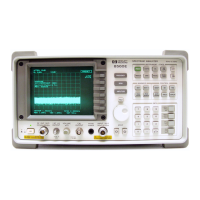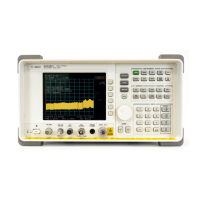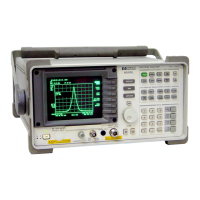Chapter 3 167
Manual Adjustment Procedures: 3335A Source not Available
2a. IF Amplitude Adjustments
A5 Reference Attenuator Adjustment
1. Set the spectrum analyzer reference level to −60 dBm. If markers
are displayed, press
MKR and MARKERS OFF.
2. Set the E4421B
AMPLITUDE to −60 dBm.
3. Connect a BNC cable between the RF output of the E4421B and the
spectrum analyzer INPUT 50Ω .
4. On the spectrum analyzer, press
CAL and REF LVL ADJ. Use the front
panel knob or step keys to place the peak of the displayed signal
3 dB to 5 dB below the reference level.
5. On the spectrum analyzer, press
PEAK SEARCH and MARKER DELTA.
Set the spectrum analyzer reference level to −10 dBm.
6. Change the 4421B Amplitude to −10 dBm.
7. On the spectrum analyzer, press
CAL.
8. Note the ∆MKR amplitude. Ideally, it should read 50.00 dB ±0.1 dB.
9. If the ∆MKR amplitude is less than 49.9 dB, rotate A5R343 15 dB
ATTEN one-half turn counterclockwise for each 0.1 dB less than
50.00 dB. Do not adjust A5R343 more than five turns before
continuing with the next step.
10.If the ∆MKR amplitude is greater than 50.1 dB, rotate A5R343
15 dB ATTEN one-half turn clockwise for each 0.1 dB greater than
50.00 dB. Do not adjust A5R343 more than five turns before
continuing with the next step.
11.On the spectrum analyzer, press
ADJ CURR IF STATE. Note the
∆MKR amplitude reading.
12.Repeat step 1 through step 11 until the ∆MKR amplitude reading is
50.00 dB ±0.1 dB.
A5 Adjustment Verification
1. On the spectrum analyzer, disconnect W29 from A5J3. Connect the
test cable between A5J3 and the RF output of the E4421B.
2. Set the spectrum analyzer reference level to −10 dBm.
3. Set the E4421B
Amplitude to −5 dBm.
4. On the spectrum analyzer, press
MKR and MARKER NORMAL.
5. The MARKER amplitude should read −10 dBm ±0.13 dB. If the
reading is outside of this range, repeat step 4 of “Procedure” on page
165 through “A5 Reference Attenuator Adjustment” step 12.

